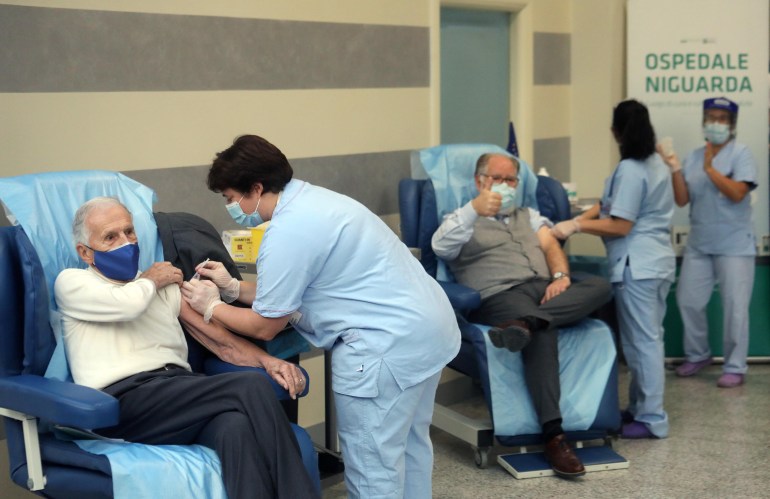Today, Sunday, in Europe, an expanded vaccination campaign against the Coronavirus began, with the hope of conquering the epidemic within a few months, and with the outbreak of the new strain of the virus, more countries have imposed, or are preparing to impose additional restrictions.
Most of the European Union countries have begun extensive vaccination campaigns using the vaccine developed by the American company "Pfizer" and "BioNTech" Germany, and this vaccine received a green light from the European Union, and before that from the United States.
The President of the European Commission described the campaign as a new page to turn the story of the epidemic, which has so far caused 25 million infections, including more than half a million deaths in Europe.
The first vaccinations took place this morning in Italy, followed by Spain, and the campaign targets the most vulnerable groups, especially health workers and the elderly.
In Italy, the most affected in Europe by the epidemic, with 71,000 deaths, the first person to receive a dose of the vaccine was a nurse and director of an epidemiological laboratory at a hospital in Rome, while the first person who received it in Spain was a 96-year-old woman.
In France, the first people to be vaccinated against the Corona virus were residents of two nursing homes.
The day before the official launch of the comprehensive campaign in the entire European Union, Germany, Hungary and Slovakia initiated the initiation of vaccinations.
It is assumed that the European Union countries will obtain approximately 300 million doses of the American-German vaccine, whose effectiveness exceeds 90%, according to previously signed contracts.
And before the European Union, vaccination campaigns were launched in the United States, Britain, Russia, Canada, Mexico and Chile, and China was the first country to do so last summer.
A few days ago, the director of the American Institute of Infectious Diseases and Allergy, Anthony Fauchi, said that achieving what is termed "herd immunity" requires the vaccination of 70% to 85% of the population in any country.
Two people receive a dose of the Coronavirus vaccine in a hospital in Milan, Italy (Reuters)
Strict restrictions
Although the vaccine was launched for use in Europe represents a glimmer of hope, some European countries are waiting for a return to the application of strict restrictions with the end of the holiday week, especially with the emergence of a new strain of the virus that continues to spread from Britain.
In light of the alarming number of cases recorded in Corona, many countries imposed again additional restrictions, such as Austria, which imposed a stone on its residents on Saturday until the 24th of next month.
Italy and Ireland had reimposed restrictions before Christmas, and local lockdowns or severe restrictions have affected millions of people in the UK.
In France, Health Minister Olivier Ferrand warned that his country does not rule out imposing a third lockdown if the epidemic situation worsens, despite the recent decline in deaths and infections with the virus.
In the same context, the Israeli government imposed a stone today in light of the increasing number of infections, and Israeli Prime Minister Benjamin Netanyahu said that a quarter of Israelis would be vaccinated against the Corona virus within a month to return to normal life.
And in South Korea, which is witnessing record numbers of infections, the authorities announced today that they will extend the social distancing measures imposed to curb the spread of the Corona virus, for a further 6 days, ending on January 3.
In Iran, the Ministry of Health said that the death toll today, which is 119 deaths, is the lowest in more than 3 months, and this comes in light of the curfew in effect in many regions of the country.
The new strain,
and China announced today the suspension of flights with Britain, to join dozens of countries in Europe and around the world, fearing an outbreak of the new strain of Corona virus, which is believed to be highly contagious.
Several countries announced yesterday that they had discovered infections with the mutated Corona virus on their soil, including Canada, Italy, Sweden, Spain and Japan, after announcing the presence of cases in France, Germany, Denmark and Lebanon.
For the same reason, Japan decided to stop receiving new arrivals from non-resident foreigners on its soil from Monday until the end of January.
According to a study conducted by the London School of Hygiene and Tropical Medicine, this strain is 50% to 74% more contagious than its predecessors, which raises fears of an increase in severe cases requiring intensive care in hospitals and deaths during the next year compared to the current year.
On the other hand, the Sultanate of Oman announced today the reopening of its land, air and sea ports, starting from tomorrow, Tuesday, after being closed for about a week due to the emergence of the new strain of Corona virus.
This comes at a time when the authorities began a campaign of vaccination with the "Pfizer-Biontech" vaccine, as part of a strategy that covers about 60% of the Sultanate's population.
Not the last
Meanwhile, WHO chief Tedros Adhanom Ghebreyesus warned today that the epidemic caused by the Coronavirus will not be the last.
In a video clip marking the International Day of Epidemic Preparedness, he said that attempts to improve human health are "doomed to failure" if the problem of climate change and animal welfare is not dealt with.

